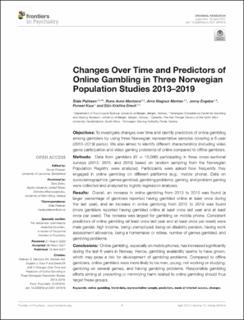| dc.description.abstract | Objectives: To investigate changes over time and identify predictors of online gambling among gamblers by using three Norwegian representative samples covering a 6-year (2013–2019) period. We also aimed to identify different characteristics (including video game participation and video gaming problems) of online compared to offline gamblers.
Methods: Data from gamblers (N = 15,096) participating in three cross-sectional surveys (2013, 2015, and 2019) based on random sampling from the Norwegian Population Registry were analyzed. Participants were asked how frequently they engaged in online gambling on different platforms (e.g., mobile phone). Data on sociodemographics, games gambled, gambling problems, gaming, and problem gaming were collected and analyzed by logistic regression analyses.
Results: Overall, an increase in online gambling from 2013 to 2015 was found (a larger percentage of gamblers reported having gambled online at least once during the last year), and an increase in online gambling from 2015 to 2019 was found (more gamblers reported having gambled online at least once last year and at least once per week). The increase was largest for gambling on mobile phone. Consistent predictors of online gambling (at least once last year and at least once per week) were male gender, high income, being unemployed, being on disability pension, having work assessment allowance, being a homemaker or retiree, number of games gambled, and gambling problems.
Conclusions: Online gambling, especially on mobile phones, has increased significantly during the last 6 years in Norway. Hence, gambling availability seems to have grown, which may pose a risk for development of gambling problems. Compared to offline gamblers, online gamblers were more likely to be men, young, not working or studying, gambling on several games, and having gambling problems. Responsible gambling efforts aiming at preventing or minimizing harm related to online gambling should thus target these groups. | en_US |

